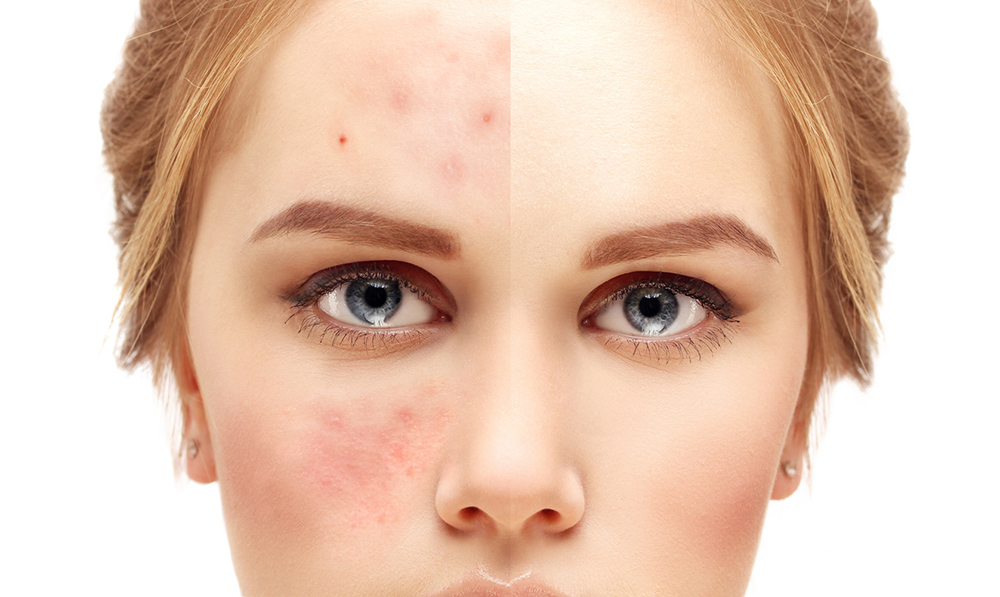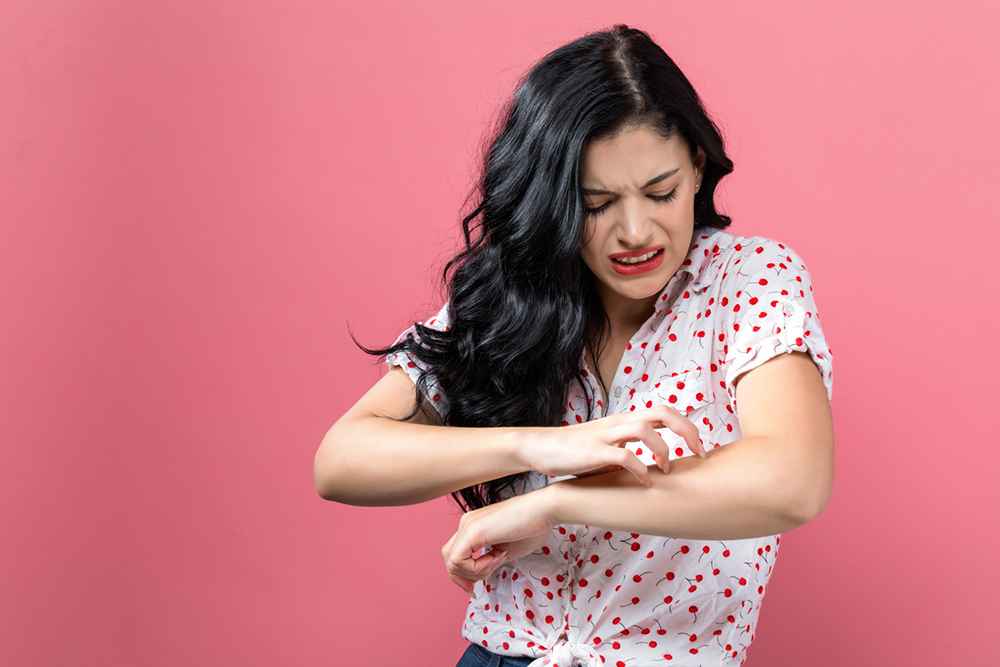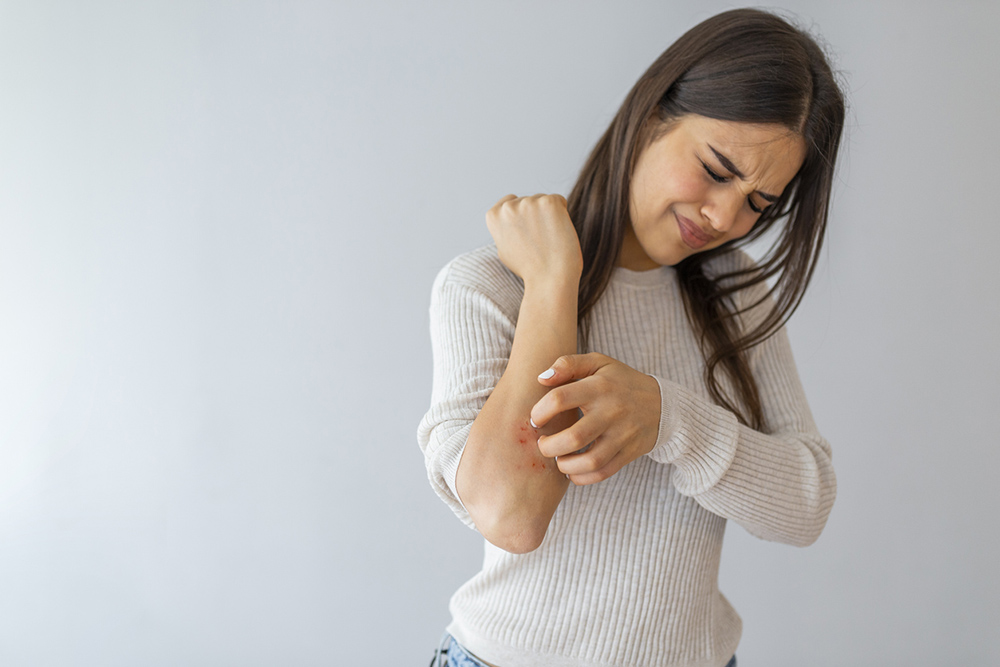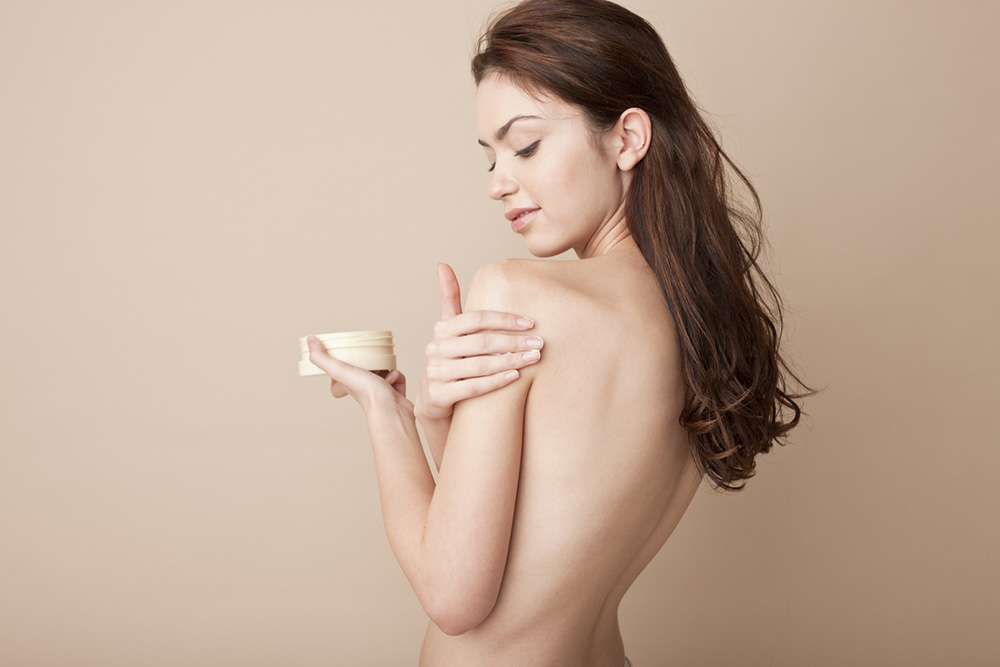4 ways stress is showing on your skin and exactly how to cope
That spot or itch you get when you’re under pressure is not your imagination. There’s a strong link between stress and your skin, and therefore your skin and mental health – but you can beat it
Stress can cause skin conditions and skin diseases cause more stress, and often that stress turns into mental health issues – it’s a vicious cycle.
In fact, nine in ten dermatologists agree that not enough importance is placed on the psychological effects resulting from skin conditions says a recent survey undertaken by the British Skin Foundation.
nine in ten dermatologists agree that not enough importance is placed on the psychological effects resulting from skin conditions
Whilst dermatology is making great advances in treating most skin diseases, it seems not enough is being done to address the accompanying psychological effects these skin conditions cause.
Indeed, 70 per cent of British people have visible skin conditions or scars that affect their confidence. It seems more research is needed to treat both the skin condition and to find effective psychological treatments that support both children and adults living with skin conditions.
Stress and skin
Someone says something embarrassing and you blush a deep, vivid red. If you’ve ever wondered why an emotional reaction to such as embarrassment can suddenly cause every blood vessel in your skin to instantaneously open up, we have news.
‘Stress and the skin are very closely linked,’ says Professor Anthony Bewley, consultant dermatologist at The Royal London Hospital and Whipps Cross University Hospitals NHS Trust and honorary senior Lecturer in dermatology at Queen Mary University London.
From itching to spots, psoriasis to eczema, stress can exacerbate existing skin conditions and even trigger new ones in people who have a genetic predisposition to them, Prof. Bewley explains.
What’s more, in a cruel vicious cycle, once those skin problems start to show, the resulting stress from them can make the condition worse.
Stress and the skin are very closely linked
‘We don’t often know which comes first, the stress or the skin problem,’ Prof. Bewley explains. ‘There is probably a cycle that forms where stressful events or pressures lead to skin problems such as eczema or psoriasis or itching [see below] and then, having the condition is stressful and exacerbates it further.’
Prof. Bewley has a special interest in the burgeoning field of psychodermatology; where, both privately and at some NHS hospitals, dermatologists now work together with psychologists and psychiatrists to soothe the stress issues exacerbating skin problems.
In fact, so closely connected is the skin to your stress levels that the American Association of Dermatology’s guidelines state that ‘ ‘traditional dermatologic therapies should be used in conjunction with stress management therapies to treat stress related skin conditions.’
The types of skin diseases most likely to be exacerbated by stress include anything that is considered an inflammatory skin disorder such as eczema, psoriasis, vitiligo and acne, but also conditions such as itching, says Dr Bewley.
Let’s take a close look at some of the key ways stress can show on your skin and keep reading for the steps you can take to break the cycle.
Dry, itchy – stressed – skin
If you have no genetic likelihood toward serious skin diseases such as eczema or psoriasis and suddenly you go through a stressful patch, you may find yourself with skin that is drier than usual, along with scaling, dandruff and itching – especially itching, Dr Bewley asserts.
In fact, according to research carried out on over 2000 adults in February this year,[i] 44 per cent of people who have dry, itchy skin also reported feeling stressed daily, compared to 29 per cent of non-sufferers.

So how can what’s in our minds affect our skin so acutely?
‘When you get stressed, the C-nerve fibres in your skin (that’s short for cutaneous nerve fibres which are your skin’s itch fibres) which are connected directly to your brain become more sensitive and that manifests as increased dryness and itching,’ he says.
That can be compounded by some of the other by-products of stress too. ‘When you’re under stress, you’re probably getting less sleep and we know that sleeplessness can also increase this C-fibre sensitivity.’
Certain chemicals can be particularly irritating on skin that is already stressed, especially detergents
This vicious cycle keeps going. ‘As skin gets drier when you’re under stress, your immune system’s resilience is also reduced,’ says Prof. Bewley. ‘That can mean you have more reactions such as itching to detergents and irritants in soaps, creams and fragrances’.
Certain chemicals can be particularly irritating on skin, that is already stressed, especially detergents such as sodium lauryl sulfate (or anything with ‘sulfate’ in its ingredients as these are harsh detergents that strip the skin of its natural barrier), parabens and soaps, says Dr Bewley.
Below, we have specific steps you can take to combat your itchy, dry skin.
Eczema
There are many types of eczema (also called contact dermatitis) which refers to allergic, inflamed skin causing redness, chronic itching, blistering and flaking. Typical triggers include irritants and substances that irritate the skin according to the NHS website – for example wool against the skin, harsh soaps, perfumes, weather changes and allergies to certain metals. But stress is also a key trigger[i].
‘If you already have a skin disease such as eczema and there are stressful life events going on, there is not only a far greater risk that your skin disease will be exacerbated but also a greater likelihood that that the healing of the condition will also be delayed,’ Prof. Bewley asserts.

Adult acne
You probably don’t need a scientific study to prove you get spots when you’re stressed, but we will give you one anyway. A paper in 2017 examined the skin of university students and found that their acne increased in severity, the more stress they were under.[i]
Acne is triggered by an excess of male or ‘androgenic’ hormones that over-stimulate the skin’s oil glands causing it to become blocked and inflamed, according to the NHS website. [i]
Psoriasis
Unlike eczema, psoriasis – which causes red, flaky, crusty patches of skin covered with silvery scales – is not an allergic reaction but a disorder of the immune system and one of its most common exacerbators is stress, says Dr Bewley.
It’s usually inherited from parents, and it is often in those people who have a genetic susceptibility that a big stressful life event might trigger their first attack of psoriasis, he explains.
The good news is that even with severe skin conditions such as this, getting a handle on stress is essential not only to keeping them under control, but also to ensuring the treatment you are having works as best it can, Dr Bewley concludes.
In fact, one study on patients being treated with UV llght therapy for their psoriasis, found that patients who received their light therapy alongside a short daily practice of mindfulness meditation responded better to treatment and healed faster than those that received the light therapy alone.[i]

Here are nine ways to cope:
Don’t let anyone tell you it’s all in your head
‘Skin effects such as itching and flaking are not in your head, they are a real reaction to what is happening in your body,’ says Dr Bewley.
‘This is important because people can go to health care professionals and be told ‘this is all in your head,’ when it definitely has a physical component.’
So, should we scratch then? ‘Rather than scratching the itch, find better coping mechanisms to deal with the stress and avoid easy answers such as alcohol which makes it worse [see below], sugary foods and cigarettes,’ he advises.
‘Getting into a good sleep routine, using plenty of appropriate moisturising creams and moderate exercise all help.’ Read on for why.
Get mindful for ten minutes a day
Bottom line? Controlling your stress will help control your skin condition.
The good news is, it doesn’t take much mindfulness meditation practice to help your skin symptoms calm down, just ten minutes a day is plenty.
‘Even just sitting down, taking deep breaths and chilling out regularly can be enormously beneficial and help skin disease or dryness and itching,’ says Dr Bewley.
You can look for a Mindfulness Based Stress Reduction (MBSR) or Mindfulness Based Cognitive Therapy (MBCT) course to help you learn mindfulness based techniques. You do a private course (on- or off-line) or they are also offered on the NHS so ask your doctor.
If you’re short on time, apps such as Calm, Headspace and Stop, Breathe & Think take you step by step through meditations to suit different time frames and situations.
If you prefer to learn mindfulness techniques from a book, our favourite is Mindfulness: A practical guide to finding peace in a frantic world by Professor Mark Williams and Danny Penman and also comes as an audiobook.

Wash with a non-soap cleanser
Certain chemicals such as sulfate-based detergents, parabens and even soap itself can make dryness, itching and skin diseases such as eczema and psoriasis worse, Dr Bewley asserts.
‘Avoid soap and instead, wash the skin with a non-soap substitute, ideally without fragrance or sulfates,’ Dr Bewley suggests.
But don’t OVER-wash
If you love long, hot showers and suffer with dry, sensitive, irritated skin or any of the conditions we’re talking about, you could be unwittingly making them worse. ‘Try not to overwash, or have long, hot showers because this dries up the protective barrier of the skin,’ Dr Bewley warns.
Look for a moisturiser with humectants
Your choice of moisturiser – and how you apply it – will be crucial to managing itchy or sensitive skin conditions.
‘Look for a moisturiser without perfumes and which contains a humectant,’ says Prof. Bewley. ‘This is a chemical that holds water within the skin, which is crucial to managing irritation, itch and other skin conditions.’
Examples of ingredients to look for that act as humectants in creams include glycerine and urea.
For itchy skin, Dr Bewley recommends Diprobase Itch Relief Cream £14 (from Boots), which is clinically proven to relive itch caused by conditions such as dry skin and eczema within 30 minutes. It contains the humectant urea, is steroid-free and helps regenerate the skin’s barrier. (Also available to buy on Amazon in the US and in the UK).
For use everyday, Diprobase Daily Moisturising Cream £11 (from Boots) also contains the humectant urea and used daily, has been shown to help strengthen the skin’s barrier and reduce dry skin flare ups for up to three months*. (Also available to buy on Amazon in the US and in the UK).
*96% of babies completing the clinical study did not develop new flare-ups of extreme skin dryness over three months.

…and apply it properly
When you’re using moisturising creams, emollients and ointments, it’s tempting to lay it on thick, but applying it lightly and more often is better.
‘Use creams and emollients thinly and frequently, applying them in the direction of hair growth,’ Dr Bewley recommends.
So, if you’re having an outbreak, though it’s less convenient it’s better to re-apply a little every couple of hours rather than a lot once a day.
Go easy on alcohol
We don’t like this advice either – and, it surprised us. ‘Alcohol causes vasodilation, which means it increases blood flow to the skin,’ says Dr Bewley.
‘That increases the body’s inflammatory burden and also negatively affects the peripheral nerves and central nerves that are helpful for healthy skin – in short, alcohol exacerbates any inflammatory skin condition.’ And in case you’re wondering, dry, itchy skin, acne, psoriasis and eczema are all inflammatory.
Exercise daily – but don’t overdo it
‘Any moderate exercise done for 20-30 minutes daily will settle down the sensitivity of the nervous system, and this will have a positive effect on the health of the skin,’ says Dr Bewley.
‘Exercise not only reduces the inflammatory load within the skin, it also increases its lipid content from the inside out which stops skin getting quite so dry,’ he says.

Who would have thought that along with all its other benefits, exercise can actually help to prevent your skin getting so dry?
Do be aware though, that too much exercise could make a skin condition worse because of the stress it places on the body.
‘The benefits of exercise to skin work as a U-curve,’ says Dr Bewley. ‘Moderate exercise done for 20-30 minutes daily, that includes resistance training, walking, jogging, dancing or swimming is protective for the skin. But while of course too little exercise is not good for skin, too much or too intense can be detrimental because it increase the stress load on the body.’
If things don’t get better, see your doctor
While some people have skin conditions exacerbated by stress, others find their existing skin conditions so stressful they develop anxiety, depression and other mental health problems as a result, says Dr Bewley.
The importance of this link is why the field of psychodermatology is growing. So, if you have tried all the of above suggestions, Dr Bewley suggests talking to your doctor who can refer you to a dermatologist.
‘Most general dermatologists can manage low impact stress related skin conditions but if your condition is overwhelming and is seriously affecting your everyday wellbeing, you can ask to see a psychodermatologist – just be aware there are not many centres in the country and you may have to travel or wait if you’re looking to have it on the NHS,’ Dr Bewley points out.













